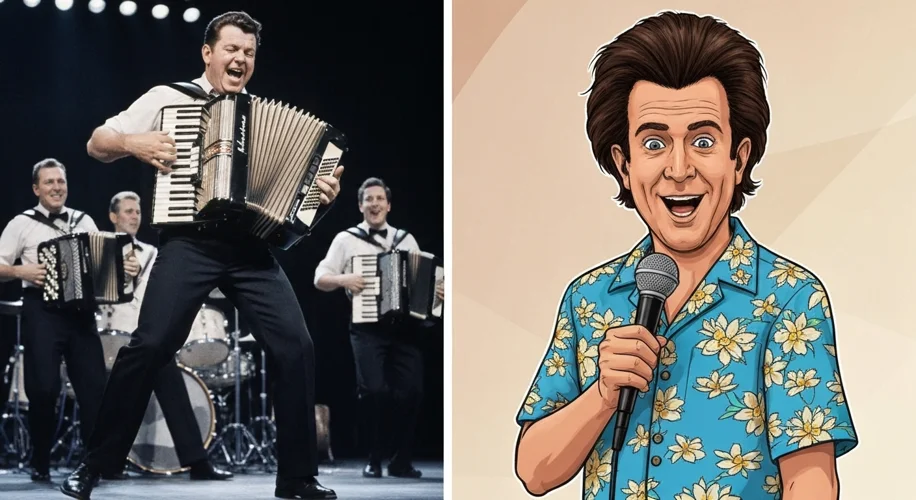In the vibrant tapestry of American music, certain threads, though seemingly niche, weave indelible patterns. Polka, with its infectious oom-pah rhythm and celebratory spirit, is one such thread. And when we talk about polka legends in America, two names often rise to the surface, not just for their musical prowess but for a peculiar, almost coincidental, connection: Frankie Yankovic and “Weird Al” Yankovic.
Frankie Yankovic, often hailed as the “America’s Polka King,” was a titan of the genre. Born in 1915 in a Slovenian immigrant community in Cleveland, Ohio, his early life was steeped in the traditions of his heritage. The accordion was his voice, and his band, Frankie Yankovic and His Orchestra, became synonymous with the lively, foot-stomping sound that resonated with millions, particularly during a time when polka was at its peak popularity in the United States. His signature tune, “Beer Barrel Polka (Roll Out the Barrel),” became an anthem, a testament to his ability to capture the joyous essence of the polka. Yankovic’s career spanned over six decades, earning him a Grammy Award and cementing his status as a cultural icon.

Now, enter “Weird Al” Yankovic. Born Alfred Matthew Yankovic in 1959, his journey into music took a distinctly different, yet undeniably polka-infused, path. Unlike Frankie, who was a purist of the genre, “Weird Al” carved out a unique niche as a master of musical parody. His comedic genius lies in his ability to take popular songs and transform them with hilarious, often satirical, lyrics, frequently incorporating polka rhythms into his arrangements. Hits like “Eat It” (a parody of Michael Jackson’s “Beat It”) and “Smells Like Nirvana” (a parody of Nirvana’s “Smells Like Teen Spirit”) showcased his innovative brand of comedy music, which often featured polka as a surprising, yet delightful, element.
The striking similarity in their last names – Yankovic – has long fueled speculation about a familial connection. While both men are of Slovenian descent, their surnames, though spelled identically, are pronounced differently. Frankie Yankovic pronounced his name YAHN-ko-vich, emphasizing the first syllable. “Weird Al” Yankovic, on the other hand, uses a pronunciation that aligns more with the spelling, YAN-ko-vich, with emphasis on the second syllable. This subtle difference, coupled with the fact that “Weird Al” hails from Downey, California, while Frankie was a product of Cleveland, has led to the general understanding that they are not closely related, if at all. They are more like parallel universes of musical talent, both touching the heart of America with their unique styles, yet originating from different branches of the vast Yankovic family tree.
However, the story of their names and shared genre is more than just a curious anecdote. It speaks to the rich history of polka in America. Polka music arrived in the United States with immigrants from Central and Eastern Europe – primarily Germany, Poland, and Slovenia – in the late 19th and early 20th centuries. These immigrants brought their cultural traditions, including their music, which provided a sense of comfort and community in a new land. Cleveland, in particular, became a hub for Slovenian culture, and polka music flourished there.
Frankie Yankovic’s career coincided with polka’s golden age in America. From the 1940s through the 1960s, polka was a staple on radio waves and at social gatherings. He was instrumental in popularizing the genre, making it accessible to a broader audience beyond the immigrant communities. His music was about celebration, tradition, and the simple joy of life.
“Weird Al” Yankovic, emerging decades later, encountered a very different musical landscape. Polka, while still existing, was no longer at the forefront of mainstream popular music. Yet, he recognized its inherent charm and comedic potential. He didn’t just use polka; he reimagined it, blending it with rock, pop, and his signature satire. In doing so, he kept the spirit of polka alive for a new generation, introducing elements of its characteristic sound to audiences who might never have encountered it otherwise. His inclusion of polka instruments and rhythms in his parodies served as a playful nod to the genre’s roots and to legends like Frankie Yankovic.

The enduring appeal of both artists lies in their ability to connect with audiences on an emotional level. Frankie Yankovic offered a direct line to heritage and communal joy, a sound that could make anyone want to dance. “Weird Al” offered laughter and a clever commentary on popular culture, often using that same infectious polka beat to drive his point home. Their stories, though distinct, are intertwined through the shared language of music and the enduring legacy of polka in the American consciousness.
While they may not have been blood relatives, Frankie and “Weird Al” Yankovic are undeniably related by their profound impact on American music. One as the undisputed king who brought polka to the masses, the other as the eccentric genius who playfully wove its spirit into the fabric of modern comedy. Together, they represent two powerful, albeit very different, echoes of the same vibrant musical tradition.
Their shared surname, therefore, becomes less of a genealogical mystery and more of a delightful coincidence that highlights the enduring, and sometimes surprising, presence of polka music in the American story. It’s a reminder that even in the most unexpected places, the rhythm of the polka can still be found, keeping spirits high and feet tapping, thanks in no small part to these two remarkable Yankovics.

